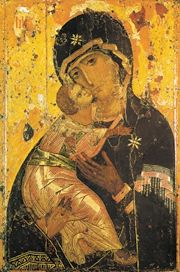NEW YEAR: 1ST OF JANUARY: Lk 2:16-21
Today is a day of reflection and self-examination, as we come to the end of 2012, and it is at the same time, a day to revive our hope, as we make resolutions for the in-coming year.
Celebrating Mary, the mother of God
The liturgy of the Church proposes to all of us that we start the new year in the company of Mary, the mother of the Lord. Indeed, as she was blessed, may we be blessed too.
On the 1st of January, we celebrate Mary, the mother of God, as we pray for peace. Calling Mary the mother of God may sound strange to many, and lot of Christians reject thus title outright. However, we must remember that such a title as a long history behind it, being accepted in the first Council of Ephesus (431 ad) as an affirmation of faith in Jesus Christ, the Son of God.
The dispute about the title
For a long time, people had been calling Mary Theotokos (the Greek title meaning Mother of God). Then Nestorius, Patriarch of Constantinople, started teaching that we should call Mary simply the mother of Jesus or the mother of Christ, and he explained that, in Jesus Christ, human and divine natures are not united in one person that is the Son of God. People reacted, and the Council of Ephesus was called to solve the dispute. Nestorius’ teaching was condemned to the great rejoicing of people.
A profession of faith in Jesus, the Son of God
This title speaks about Mary and speaks about Jesus, her son. About Mary, it is an honorific title, reminding us of Mary's special role, given to her by God. It is in line with the words of Elizabeth, when she said: "And why has this happened to me, that the mother of my Lord comes to me?" (Lk 1:43).
By calling Mary the Mother of God, we do not mean that she conceived and generated God in her womb, or that God was born from her. In fact, the title is a profession of faith, not about Mary, but about Jesus, proclaiming that her Son, Jesus the Christ, is God. Nestorius started teaching that, in Jesus Christ, the two natures - the human and the divine - are just somehow put together. The Council of Ephesus teaches that the human and divine natures are united in one person (one true self) - the person of the Son of God.
"If anyone does not confess that God is truly Emmanuel, and that on this account the Holy Virgin is the Mother of God (for according to the flesh she gave birth to the Word of God become flesh by birth), let him be anathema." (Can. 1.of the Council of Ephesus).















